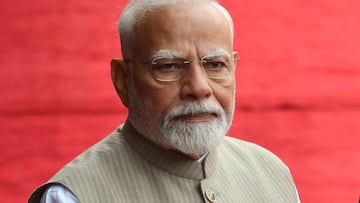These are Narendra Modi and Droupadi Murmu, the Prime Minister and the President of India: Career, political views...
Prime Minister Narendra Modi and President Droupadi of India are at the center of a geopolitical crisis between India and Pakistan, following rising violence and tensions over Kashmir.

Prime Minister Narendra Modi’s Hindu nationalist Bharatiya Janata Party (BJP) was re-elected in 2024, and he continues to serve as Head of State, alongside President Droupadi Murmu, who is also a BJP member.
These elections came at an extremely consequential moment for the country, and as violence with Pakistan escalates, we are taking a look at the political views of India’s top leaders.
Droupadi Murmu became president in 2022, after serving as the governor of Jharkhand, which is a position appointed by India’s president. Murmu was named by Pranab Mukherjee, a member of the Indian National Congress at the time. Before taking on the roles of governor and president, Murmu had been a prominent BJP figure in her home state of Odisha.
India and Pakistan have been at odds for decades, and this week, in April, these tensions escalated dramatically following an attack on civilians by a gunman, which left 26 tourists dead in Indian-controlled Kashmir. In a social media post, the Indian embassy in the United States said that the government “has credible leads, technical inputs, testimony of the survivors and other evidence pointing towaesd the clear involvement of Pakistan-based terroritsts in this attack.”
— India in USA (@IndianEmbassyUS) May 6, 2025
On May 7, the Indian government said that it struck “terror camps,” in a total of nine attacks in “Pakistan and Pakistan-occupied Jammu and Kashmir from where terrorist attacks against India have been planned and directed.” However, CNN has reported that some initial images of the aftermath show that there have been civilians harmed, including women and children, but these reports have yet to be confirmed by the network.
Modi’s rise to power
Modi was born in 1950 in a small town in western Gujarat state to a low-caste family. His father was a tea seller. He has used his humble origins and outsider status as part of his persona to connect with the public. A good example of this is when he was insultingly referred to as ‘chaiwala’, or tea seller, by a member of the opposition when he ran for PM the first time. He used that to paint the Congress party as elitists and organized ‘chai pe charcha’, or ‘discussion on tea’ events.
As well, he portrays himself as a devout Hindu living a simple, ascetic lifestyle. At 73 he is single and has no children, although he was married but left his wife when he was 17.
Modi joined a right-wing paramilitary organization, the Rashtriya Swayamsevak Sangh (RSS), as a young boy. The group advocates for Hindu hegemony in India and is the ideological parent of his party the BJP.
India’s Prime Minister Narendra Modi has used the Hindu god Ram as a political weapon against Muslims, undermining one of Hinduism’s fundamental teachings—nonviolence—and turning one of its heroes into a monster, @VidyaKrishnan writes: https://t.co/e5NXLZQgCX
— The Atlantic (@TheAtlantic) June 5, 2024
He came to political prominence in 2001 when he became the chief minister of his home state of Gujarat. Not long after, there were anti-Muslim riots in which 1,000 people, mostly Muslims, were killed.
He was suspected of quietly supporting the aggression against the Muslim community, but a Supreme Court-appointed panel in 2002 found no evidence. Still, the US revoked his visa in 2005 based on concerns that he failed to act to stop the communal violence.
Then, in 2014, Modi led his Hindu nationalist party to victory over the then-ruling Congress party in the general elections that year with the BJP taking 282 seats, an absolute majority, in the 543-seat Lok Sabha, the lower house of Parliament. He promised to jump start the economy with sweeping reforms, which resonated with a public fed up with corruption.
He won reelection in a landslide victory in 2019 on the back of nationalist sentiment and with a more straight forward Hindu-first message.
During his time in office so far, he has been accused of stoking religious and ethnic divisions and eroding the nation’s democracy through strong-arm tactics. His critics say that Modi has worked to limit independent media and stifle dissent stacking the deck against the opposition.
For his supporters, he is credited with helping to grow India into the world’s fifth largest economy through his policies and improving welfare programs on which a majority of India’s citizen rely.
Droupadi Murmu became president in 2022, after serving as the governor of Jharkhand, which is a position appointed by India’s president. Murmu was named by Pranab Mukherjee, a member of the Indian National Congress at the time. Before taking on the roles of governor and president, Murmu had been a prominent BJP figure in her home state of Odisha.

Complete your personal details to comment
Your opinion will be published with first and last names